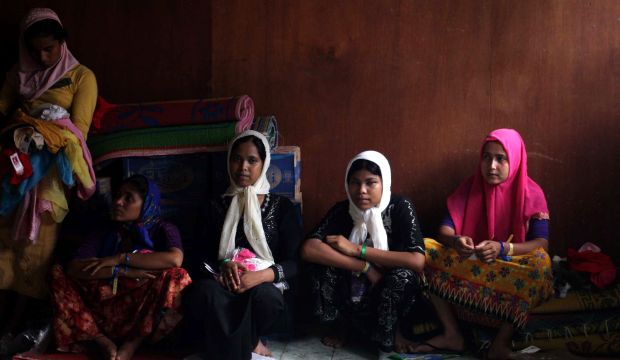
Rohingya and Bangladeshi migrants at a temporary shelter in Bayeun village, Aceh province, Indonesia, on May 23, 2015.
(EPA/Dedi Sahputra)
Yangon, Myanmar, AP—Navy ships were scouring Southeast Asian waters for boats believed to be carrying thousands of migrants with little food or water, and a top US diplomat said Myanmar needs to shoulder some responsibility for the crisis. That’s something it has been reluctant to do.
US Deputy Secretary of State Anthony Blinken said Friday that Rohingya Muslims fleeing the predominantly Buddhist nation were risking perilous journeys and putting their lives in the hands of human traffickers because “they are in despair and don’t see a future” at home.
They have been denied citizenship and chased off their land in the latest bout of ethnic violence that left them with little access to education, medical care or freedom to move around.
The persecution has sent them fleeing to neighboring Southeast Asian countries, but recently, the exodus has erupted into a humanitarian crisis. Because of arrests after a crackdown on human trafficking networks in the region, captains earlier this month started abandoning boats that were packed with Rohingya Muslims as well as Bangladeshis escaping poverty.
More than 3,600 migrants have washed ashore in Indonesia, Malaysia and Thailand since May 10, and thousands more are believed to be trapped at sea. The United Nations has warned that time is running out to save them.
“The root of the problem for those leaving Myanmar is the political and social situation on the ground,” Blinken told reporters at a news conference in Yangon.
He said Rohingya Muslims “should have a path to citizenship,” adding: “The uncertainty that comes from not having any status is one of the things that may drive people to leave.”
He said he made that point when he met with President Thein Sein, the army commander-in-chief and other top officials.
At first, Malaysia, Indonesia and Thailand were reluctant to help, worried that accepting even a few refugees would open the floodgates for more. But on Wednesday, Indonesia and Malaysia agreed to shelter new arrivals as long as the international community promised to help resettle them to third countries within a year.
UN Secretary-General Ban Ki-moon on Saturday also called for addressing the crisis that causes the flight of the migrants.
“At the same time, it’s important to save human lives,” he said on a visit to Hanoi, Vietnam. Ban said he has been in discussion with regional leaders in Myanmar, Malaysia and Thailand, among others, to urge them to provide search and rescue operations and options for resettlement and reintegration.
Ban said it was important “not to send them back to a dangerous circumstance or situation.”
In the first official rescue operation, four Malaysian navy ships started searching for boats Friday, said navy chief Abdul Aziz Jaafar. He said three helicopters and three other ships were on standby.
Myanmar’s navy found two fishing trawlers filled with 208 men during a patrol off Rakhine state, the main point of departure for fleeing Rohingya.
Zaw Htay, director of the presidential office, said the men were identified as Bangladeshi and would be sent to the neighboring country.
Rohingya, numbering at around 1.3 million, have been identified by the United Nations as one of the most persecuted minorities in the world.
After Myanmar moved from dictatorship toward democracy in 2011, newfound freedoms of expression gave voice to Buddhist extremists who spewed hatred against the religious minority and said Muslims were taking over the country. Attacks that followed left up to 280 people dead. Another 140,000 Rohingya were driven from their homes and are now living under apartheid-like conditions in crowded displacement camps.
The government refuses to recognize them, regarding them as illegal migrants from Bangladesh, even though many have lived in Myanmar for generations.
It has expressed skepticism that those fleeing are actually from Myanmar and insists it is not to blame for the current crisis.
After initially saying it might boycott a meeting next week in Thailand to address the problem, it agreed to attend, saying the invitation letter did not use the term Rohingya and did not say that Myanmar was solely to blame. Those were the conditions the government had set.
“We are ready to cooperate with other governments to resolve the ongoing problems through constructive engagement and on humanitarian grounds,” Zaw Htay said.
The United States, which initially insisted it was a regional problem, has in recent days also become involved.
It is preparing to send “maritime aviation patrols throughout the region,” Pentagon spokesman Lt. Col. Jeffrey Pool said Thursday, adding that the Department of Defense “is responding to this crisis and taking this seriously.”
Washington has been urging governments in the region to cooperate on search and rescue operations and sheltering the migrants.
